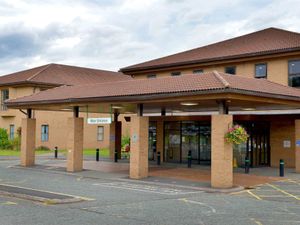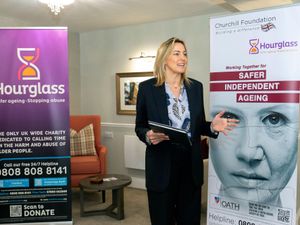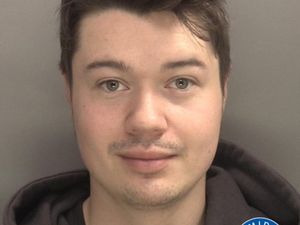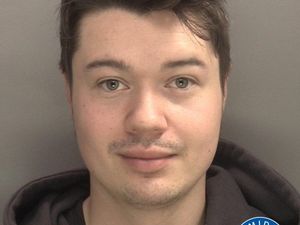'Gross failure' led to 'preventable' death of newborn baby girl at hospital, coroner rules
A baby died at a hospital just hours after being born because of a "gross failure" to properly monitor her heart, a coroner has found.

Poppy Mary Isabella Russell died 11 hours and 50 minutes after being born at the Princess Royal Hospital (PRH) in Telford at 5.55pm on April 11, 2021, after being delivered by emergency caesarian section.
The hospital, which is run by Shrewsbury and Telford NHS Trust (SaTH), had been accused of "neglect" by parents Neil and Kathryn Russell of Shrewsbury, after they claimed hospital staff failed to properly monitor the baby's heart rate.
Following an inquest into Poppy's death held earlier this month, Shropshire Coroner John Ellery has released his findings into her death which he said was "preventable".
He found Poppy had died from Perinatal Asphyxia - a lack of blood flow to the baby during birth - caused by "chronic intermittent and acute cord compression", but he dismissed claims by hospital staff that Poppy's mother had failed to consent to having her baby's heart monitored.
Mr Ellery said: "It was clear from Mrs Russell s birth plan that the first list of her priorities was regular monitoring of the baby's heart. It is inconceivable that she would have changed her mind and wanted anything less."
He added that the intermittent auscultation (AI) - fetal monitoring that should have detected that the baby was in difficulty - was "vital and essential for the safety and welfare of the child".
"The consequences, as tragically demonstrated in this case, can be fatal," he added.
"I believe that at the critical time between 2.00am and 3.15am, Poppy was or would have been suffering and displaying symptoms of intermittent cord compression.
"These signals should have been picked up and in the situation which unfolded there was a failure to do so, leading to Poppy's preventable death."
He conceded that Poppy's midwife "was dealing with a difficult and challenging situation" due to Poppy's mother's anxiety, but added he was left with the overwhelming impression that the midwife "was dealing with the situation which at times she accepted she was no longer in control of and was not always able to auscultate Poppy's fetal heart rate at the end of contraction".
He added that this inability to monitor the heart of baby Poppy amounted to a "gross failure".
"It was fundamental to Poppy's safety and wellbeing. Therefore, it is self-evident that such a failure must be gross as the consequence is the highest," he said.
"Drawing all this together, I reach the conclusion that Poppy s death was preventable."
Following the coroner's conclusion, Poppy's parents issued a statement and called for a "full and public apology" from SaTH.
They said: “We are heartened that Mr Ellery has reached the conclusion that we have long known. Despite the draft Ockenden Report being published six months prior to our daughter Poppy’s birth, her death was utterly avoidable had the report’s recommendations been implemented.
"Throughout the process the Shrewsbury and Telford Hospital NHS Trust (the Trust) has blamed us. This is unforgivable and we hope the Coroner’s finding of neglect makes them reflect on the way the trust tried to hold us accountable for Poppy’s death. We have witnessed first-hand the cultural shortcomings found by the Ockenden review and we will continue to campaign for change.
"It has been two years and six months since we lost our baby girl. Whilst we welcome the decision, this is staging post along the way for us to gain justice for the death of our daughter and add our weight and support those who lost children before us. We will not stop until those individuals and those at the highest level are held to account for their hideous and systemic failures and continued strategy of covering up neonatal death.
"We call for a full and public apology from the Trust following not only the traumatic loss of our daughter, but the blame that was laid at our door.
"We also call upon Mr Steve Barclay, Secretary of State and Social Care, to make safer maternity care a priority. There must be national scrutiny and changes. How many more children must die? How many more families have to suffer like ours before critical changes are made?
"We wish to thank Lanyon Bowdler and the legal team for their support over the last two years and also to thank the coroner for his sensitivity and empathy during this inquest.”
Hayley Flavell, director of nursing at SaTH said the trust was "sorry" for its failings and said Poppy's death had been a "tragedy".
She said: “We offer our deepest condolences to Mr and Mrs Russell for the loss of their daughter, Poppy. We recognise there were failings in the care we provided and we are truly sorry.
“The death of any baby is a tragedy, and when this happens we take urgent and appropriate action, working with external organisations as well as colleagues, to understand how we might have provided better care. We take any learnings, as individuals and as a service, and embed them within our practice.
“We have made clear improvements to our maternity services since 2021, with specific changes relating to fetal monitoring and record-keeping. There is further to go, but we remain committed to constant improvement, openness and transparency, and are working with women and families to provide the best and safest care possible.”




